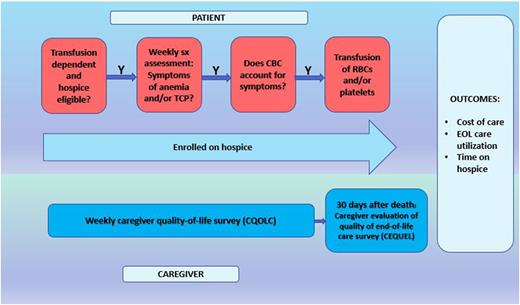Abstract
Background: Patients with hematologic malignancies (HM) have inferior end-of-life (EOL) care quality outcomes and receive more aggressive care at the EOL than do patients with solid tumor malignancies, largely related to suboptimal hospice utilization. While the reasons for this are complex, one clear barrier to optimal and timely hospice utilization for HM patients is transfusion dependence. Many patients with HM are transfusion dependent at the EOL and are loathe to forgo transfusions even after cancer-directed therapy has been exhausted, as they perceive symptomatic relief attributable to transfusions. The structure of Medicare hospice benefit, while not explicitly forbidding of blood transfusions, makes coverage for transfusions financially unfeasible for hospice agencies. In 2019, the American Society for Hematology released a policy statement urging the Center for Medicare and Medicaid Services to address this issue and called for exploration of ways to improve access to transfusions for hospice patients.
The overall objective of this pilot project is to demonstrate, through external funding of blood transfusions, that it is feasible to provide palliative blood transfusions for patients with HM while they are enrolled on hospice. The central hypothesis is that providing access to blood transfusions will result in timely referral to hospice and avoidance of aggressive care at the EOL. While direct quality of life measurements as they relate to blood transfusions will not be obtained, we posit that earlier hospice enrollment and longer time enrolled on hospice will improve EOL care quality outcomes and allow for more meaningful hospice use.
Study Design and Methods: Our study [NCT05063591] is a single-center, prospective pilot study designed to investigate the feasibility of providing blood transfusions to patients with HM enrolled on hospice, and to evaluate both EOL care quality outcomes in these patients, and caregiver quality of life and perception of patient EOL care quality. Patients with aggressive HM who are transfusion dependent (defined as requiring at least 2 units of blood products in the month prior to study enrollment) and not pursuing further cancer directed therapy are eligible for the study. Patient's primary caregivers are concurrently enrolled.
Once enrolled, patients are given the option of having either a weekly clinic visit or weekly telephone call to assess their symptom burden. Patients are evaluated in clinic or over the phone for symptoms related to anemia or thrombocytopenia. If they report these symptoms, a CBC (complete blood count) assessment is scheduled. If the CBC demonstrates a hemoglobin or a platelet count low enough to be causing the patient's symptoms and therefore warranting a palliative transfusion, then red blood cell (RBC) and/or platelet transfusion will be administered in the clinic.
Caregivers are administered the Caregiver Quality of Life -Cancer (CQOLC) survey at the time of enrollment, and weekly thereafter. One week after enrollment, a Caregiver Evaluation of Quality of End-of-Life Care (CEQUEL) is also administered to the caregiver. One month after the patient death, caregivers are contacted by phone and a subsequent CEQUEL questionnaire is administered.
The primary outcome measure is feasibility of the care model, which we define as: (1) 50% acceptance rate of the participation among screened subjects; (2) no more that 10% rate of disenrollment from the study to receive medical care for complications of transfusions or to resume their prior care model; and (3) net balance of observed transfusion-related costs with reimbursement to the hospice organization.
Secondary outcomes include measurement of standard EOL care quality measures, including number of days on hospice, inpatient days and ICU days in the last thirty days of life, inpatient deaths, and the use of chemotherapy in the last fourteen days of death. This data will be compared to both an historical cohort from our institution and population-based data we obtained through our previous SEER-Medicare linked database analysis.
Exploratory outcomes include measurement of caregiver quality-of-life and caregiver assessment of EOL care quality using the established CQOLC and CEQUEL survey instruments.
A study schematic is below.
Disclosures
Leblanc:BlueNote: Consultancy; GSK: Consultancy; Pfizer: Consultancy; BeiGene: Honoraria; Flatiron: Consultancy; Genentech: Consultancy; BMS/Celgene: Consultancy, Research Funding, Speakers Bureau; Astellas: Consultancy; Agios/Servier: Consultancy, Speakers Bureau; AstraZeneca: Consultancy, Research Funding; AbbVie: Consultancy, Speakers Bureau.
Author notes
Asterisk with author names denotes non-ASH members.


This feature is available to Subscribers Only
Sign In or Create an Account Close Modal